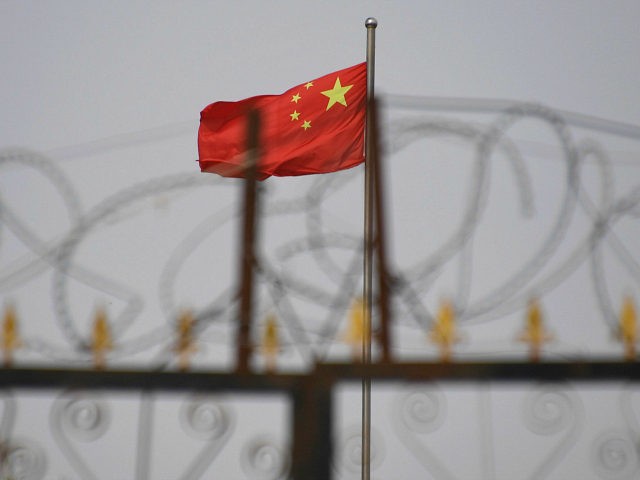The Cyberspace Administration of China on Sunday imposed even tighter controls on the heavily regulated Chinese Internet, cracking down hard on those who “spread rumors,” “harm the national honor and interests,” or post “inappropriate commentary on natural disasters and major accidents.”
The South China Morning Post (SCMP) on Monday quoted the Communist regulatory agency saying that content posted online “should be mainly positive, uplifting, and devoid of rumors.”
Those who are insufficiently positive and uplifting could find their Internet access restricted, be totally banned from posting online, or even prosecuted for criminal offenses.
The SCMP quoted Chinese state media praising the regulations as “a good start for Chinese Internet management” – as though it was not already “managed” thoroughly – and a commendable effort to “eradicate the weeds in cyberspace.”
Analysts in China – some of whom were reluctant to give their full names for fear of reprisals – told the SCMP the new censorship push was partly driven by the coronavirus epidemic, which the regime in Beijing sees as an opportunity to permanently increase its power over the speech and movement of citizens.
“I look too much like an ‘internet weed’ – I definitely don’t belong in the ‘healthy, uplifting’ part,” said one coronavirus blogger, who added that while she is accustomed to seeing her posts “disappear,” now she fears that she might disappear.
Another factor appears to be the regime’s growing antipathy to homosexuality, as some of the recently banned websites included gay themes that have been ruled “lewd” or “indecent.” Chinese bloggers who post gay material appear to have gotten the message, cutting back on posts for at least the first few days of the new regulations until they see how aggressive enforcement will be.
The New York Times speculated last week that the coronavirus has done real damage to China’s censorship machine, a perspective from which the new set of tighter regulations and more explicit penalties could be seen as an effort to claw back power and status.
The Chinese Internet has been buzzing with criticism of the government response to the epidemic, with the oppressed public growing increasingly bold as they see more of their fellow citizens speaking out and getting away with it.
Chinese social media users have been especially vicious in tearing apart Beijing’s propaganda campaigns, and they refuse to forget that early whistleblowers were treated like criminals for daring to raise alarms about the virus threat. The Times described a few of the more spectacular propaganda failures:
One newspaper in the city of Xi’an apologized after it posted an article claiming that a nurse’s newborn twins asked their father where their mother was, saying it was an editing mistake. Another newspaper wrote that after a nurse went to the front line, her husband, who had been in a vegetative state since 2014, would smile whenever her name was mentioned “as if he knew that his wife was engaged in a great endeavor.” That story was later deleted.
In China, admiration of the front-line medical workers is widespread and sincere. But the state media’s coverage does not show the reality that many of those workers lack protective gear. Over 3,000 of them have been infected.
“Their sacrifices should be remembered,” wrote a user on Weibo, one of China’s most popular social media sites. “We should make sure that the tragedies won’t happen again, not highlighting ‘Sacrifice is glorious.’”
One of the highest-profile public relations busts was the Communist Party’s wave of planted “news” stories about female nurses shaving their heads so their protective gear would fit better, and they wouldn’t be distracted from their medical duties by grooming themselves. The Communist Party thought the public would be impressed by the selfless dedication of the nurses but, instead, they were horrified by the spectacle of young women being forced to shave their heads for propaganda videos.
Another brainstorm from Party headquarters involved creating a pair of cartoon youth mascots for the anti-coronavirus effort with names drawn from the poetry of Chinese Communism founding father Mao Zedong. This campaign flopped so hard that it was withdrawn after about five hours of intense public sarcasm from China’s young people.
The coronavirus epidemic also physically damaged China’s labor-intensive censorship system by infecting some of the people who work for the Cyberspace Administration, a development that was greeted with quite a bit of rejoicing from Chinese dissidents.
Some of those dissidents predicted the Communist Party bit off more than it can chew by imposing the new regulations, since the amount of content created by citizens is growing faster than even the most heavily-staffed regulatory agencies can keep pace with, and the coronavirus crisis is teaching a growing number of Chinese citizens how to bypass the infamous “Great Firewall” to get news from the outside world and disseminate forbidden opinions.
“Such meaningless rules. In addition to providing the government more excuses, it’s not even clear how this should work,” one critic posted on Weibo, the Chinese version of Twitter, which has long been banned by the authoritarian Communist regime.

COMMENTS
Please let us know if you're having issues with commenting.